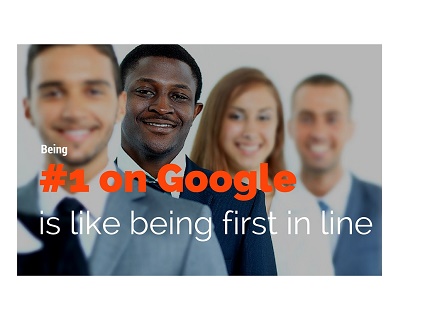Your cart is currently empty!

#1 on Google
Being #1 on Google hasn’t been the most meaningful SEO metric for some time. Different people see different things on the search engines results pages. Being #1 on Google isn’t like being six feet tall. It’s like being first in line. It depends on the line and it depends on the time.
But you can be #1 on Google. Here’s the secret:
Have the best page for the query your customer is making.
The best page for the query
Does that sound too simple? It really isn’t that simple, because you must first determine the search queries your potential customers are typing in at Google. Lots of queries are brand new and have never been typed before. Many are long and complicated. Often they’re not the first thing you think of.
For example, we built a website for a consortium of psychologists and psychiatrists. They tend to think of terms like “therapeutic interventions” and “emotional or behavioral health issues.” I’m betting that their future patient, worrying about his social anxiety or his teenage son’s troubling behavior at school, will not type “emotional or behavioral health issues” in at Google.
Google is smart nowadays, so a website may turn up in their prospective patient’s search results without having precisely the keywords that patient typed in — but not if there are better pages out there.
Here are some things that people are likely to type in the search box if they are looking for mental (or emotional or behavioral) health assistance, according to Google (data from ThinkwithGoogle and Google Trends):
- 57% search treatment options, like “counseling” or “detox” but more often things like “detox centers in Kansas City that accept Blue Cross.”
- 25% search for conditions and concerns like “social anxiety” or “depression,” but more often things like “help with depression in Bentonville.”
- 9% search for symptoms or facilities, like “counseling center” or “drug withdrawal,” but again it’s more likely to be something like, “Christian counseling centers in the East Bay.”
- 9% are looking for a specific branded term, like the name of a counseling center.
And yet many businesses and practices want to rank for generic terms. When you decide that you want to rank for “Pilates,” you are not only competing with Wikipedia rather than the other Pilates studio down the street, but you’re trying to talk to people who want general information about Pilates, not to people who are looking for a lunchtime Pilates class in a place with clean showers.
Those people looking for a lunchtime Pilates class? Those are actually your customers.
Find the queries
You can use information from Google to find out what those queries are, as I did, but you can also make a list of the questions people ask you on the phone or through your email form. Talk with your clients, patients, and customers and ask what made them decide to come to you. You can watch the discussions in social media. Pick one of those queries.
Then make sure you have the best page on the web for that query:
- the most informative page
- the most usable page
- the fastest loading page
- the best-designed page
- the most entertaining page
Realistically, you might not be able to do that. If you’ve got a page for lunchtime Pilates classes but your competitor down the street has a beautifully-written page with extensive research on lunchtime Pilates, eight interactive videos, and a link to their testimonials page, which has 33 four- and five-star reviews garnered over the past decade, you may have some catching up to do.
Pick another query. Make sure you have the best page for that query. Pick another and do it again. The more possible queries you can rank for — by having the best page for your potential customer when he or she uses a query like that — the more valuable your website will be, and the more often you’ll be at the front of the line.
by
Tags:

Leave a Reply